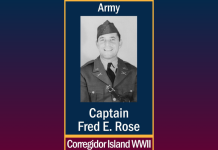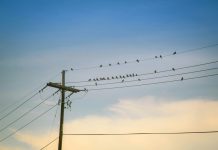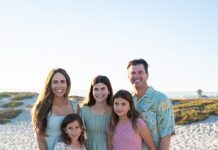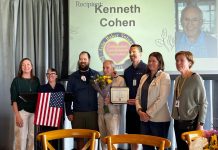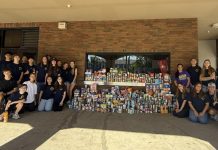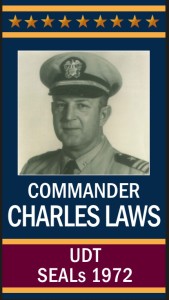
Commander Charles F. “Pappy” Laws, UDT-SEAL – By Toni McGowan
Early Frogmen like Charles Laws were considered unruly by the “black shoe” navy— who thought of them as a competent, but too individualistic, bunch. Underwater Demolition Team (UDT) members were quite proud of this label. This husky red-head was no different. Enlisting in regular Navy as an 18-year-old sailor, he worked his way all the way up to Frogman Commander. Frogmen, or UDT, were rugged forerunners of today’s Navy SEALs, but they were restricted to sea and high water mark on the beach.
Laws first served as a regular sailor in WW2. He had the distinction of climbing to Command both UDT and SEAL Teams after serving as Quartermaster in the Pacific. Laws was in the thick of the Okinawan affair and was aboard Pearl Harbor survivor ship, USS Nevada, during the atomic tests at Bikini Atoll, before volunteering for the dangerous Underwater Demolition Team (UDT) in 1949.
Laws UD-Team 3 officially arrived in Korea with fifty men in September of 1950. Their missions included destroying railways to disrupt North Korean supply lines and
minesweeping. These Frogmen pioneered “sneak inland penetration missions” to gather intelligence and destroy strategic targets.
Frogmen were typically “clad in skintight rubber suits, to ward off the cold, and with rubber fins, or webs, attached to their feet to provide greater speed, they slide silently into the water and glide away in the dark to perform their missions.”
It was a September night when five stealth rubber boats, that silently rowed towards a enemy-held beach in North Korea, faced attack full force by North Korean shore-guns that blazed with tracers exposing them and sinking two of their boats. Although all survived, the younger Frogmen reported they now realized what Hell Week was all about.
1951 earned Laws and others Bronze Star Medals with combat V for valor, “For their brave action in combat, of rescuing and caring for injured men, removing anchored live mines, initiating explosives in demolition raids against the enemy, behind enemy lines” and under fire in Korea. Laws’ team was part of an offensive that set the stage for General MacArthur’s “masterpiece of amphibious warfare” invasion at the port of Inchon during 30-foot tides. Laws’ award came directly for MacArthur’s headquarters in Tokyo.
In the mid 1950s, Laws was referred by Captain Jack Sudduth (CO of Team 12) to attend Officer Candidate School to get a commission. Laws was then in the first platoon on a deployment to Japan (1957/58) when LTJG Jim Hobbs was commanding officer. By ’66 Laws served in UD Team 11—rising to Commanding Officer early in the Vietnam War (conflict) where he served three tours. He was also Commander of SEAL Team 1. By then, “Pappy” had earned his nickname as a father figure to younger men.
After one mission, the Ocean City newspaper described this scene; “Glistening with salt sea water, the UDT unit drag their rubber boat ashore after working to clear mines from Wonsan Harbor for the waiting Marines and other troops. The landing was delayed for six days while the Frogmen worked feverishly to clear the waters of deadly mines and other obstructions. These brave men…finally made the harbor safe for the invasion forces to steam in and make a safe landing. One more mission accomplished by the rugged Frogmen…of the US Navy.”
Through excellence of the likes of Commander Charles F. Laws, and the advocacy of UDT Commander Fane, the plan to scrub Navy special ops after Korea, instead expanded to SEALs, who today provide land, sea, and air operations.
Commander Charles F. Laws was the son of adoring parents W.P. & Katherine Laws and had a deep and lasting bond with them. Laws was raised in Ocean City, MD, known for fun filled beaches and Assateague Island’s wild ponies. He was described as a very private man by his children. After retirement from the military, Charles retired in Okinawa. He later relocated to his childhood home to care for his aging parents. Commander Laws followed them not long after their deaths.
Charles married Jacqueline Lucille French from the Washington, DC area in 1947. She died in Coronado in 1996. The couple had three boys, Chris (53), Charlie (54), and Jon (55); all born at Coronado Navy Hospital North Island, directly across from the family home on Alameda. The boys were Coronado High School graduates. Charles adopted his wife’s two girls, Carole and Naida. Carole still resides in Coronado. Christopher served 18-years as an Army Ranger and passed in 2011. Jon lives in north San Diego County.
In a bit of synchronicity, Pappy Laws commanded the now defunct Ellyson Field in Florida. It was named for Commander Theodore Ellyson, another red-haired stocky man and Naval Pilot Number One at North Island. His Avenue of Heroes banner flies just across the street from the Laws’ original family home in Coronado.
Ocean City news clip provided by family (undated) Ocean City news Bio. Navy Special Warfare Captain Jim Hobbs (RET) provided the information on the first platoon to Japan, via Kenneth Wortley, platoon officer in the previous deployment.
City of Coronado banner information. Also available on Avenue of Heroes Facebook Page. Visit more Hero Biographies.




